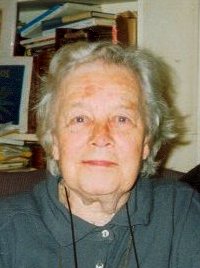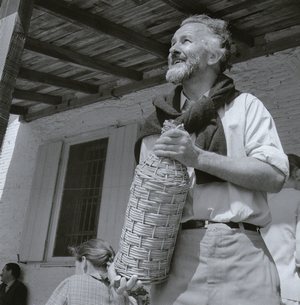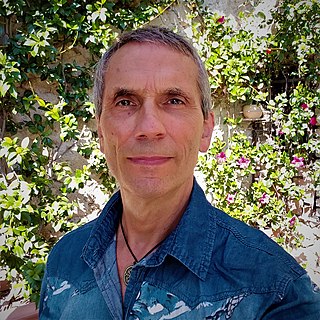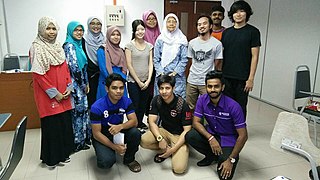Related Research Articles

Seyyed Hossein Nasr is an Iranian-American philosopher, theologian and Islamic scholar. He is University Professor of Islamic studies at George Washington University.

Kathleen Jessie Raine was an English poet, critic and scholar, writing in particular on William Blake, W. B. Yeats and Thomas Taylor. Known for her interest in various forms of spirituality, most prominently Platonism and Neoplatonism, she was a founding member of the Temenos Academy.

Traditionalism, also sometimes known as Perennialism, posits the existence of a perennial wisdom or perennial philosophy, primordial and universal truths which form the source for, and are shared by, all the major world religions. Historian Mark Sedgwick identifies René Guénon, Ananda Coomaraswamy, Julius Evola, Mircea Eliade, Frithjof Schuon, Seyyed Hossein Nasr and Alexandr Dugin to be the seven most prominent Traditionalists.
Hossein Mohyeddin Ghomshei is an Iranian scholar, philosopher, author, and lecturer on literature, art, and mysticism.

Titus Burckhardt was a Swiss writer and a leading member of the Perennialist or Traditionalist School. He was the author of numerous works on metaphysics, cosmology, anthropology, esoterism, alchemy, Sufism, symbolism and sacred art.
Henry Corbin was a French philosopher, theologian, and Iranologist, professor of Islamic studies at the École pratique des hautes études. He was influential in extending the modern study of traditional Islamic philosophy from early falsafa to later and "mystical" figures such as Suhrawardi, Ibn Arabi, and Mulla Sadra Shirazi. With works such as Histoire de la philosophie islamique (1964), he challenged the common European view that philosophy in the Islamic world declined after Averroes and Avicenna.
Philosophy is the study of general and fundamental problems concerning matters such as existence, knowledge, values, reason, mind, and language. It is distinguished from other ways of addressing fundamental questions by being critical and generally systematic and by its reliance on rational argument. It involves logical analysis of language and clarification of the meaning of words and concepts.
History of Islamic Philosophy, first published in 1996 with, is a collection of essays by various authorities on Islam in the Routledge series History of World Philosophies and is edited by Seyyed Hossein Nasr of George Washington University and Oliver Leaman of Liverpool John Moores University. The book has been well reviewed.
Brian Keeble is a British author and editor. He is the founder of Golgonooza Press and a co-founder of the Temenos and Temenos Academy.
M. Ali Lakhani, is a writer, lawyer, and editor whose works focus on metaphysics and the perennial principles found in the wisdom traditions of the world.

Keith Barry Critchlow was a British artist, lecturer, author, sacred geometer, professor of architecture, and a co-founder of the Temenos Academy in the UK.

Philip Owen Arnould Sherrard was a British author and translator. His work includes translations of Modern Greek poets, and books on Modern Greek literature and culture, metaphysics, theology, art and aesthetics. In England he was influential in making major Greek poets of the nineteenth and twentieth centuries known. Sherrard was a practising Eastern Orthodox Christian and was responsible, along with Kallistos Ware and G. E. H. Palmer, for the first full translation of the Philokalia into English. He also wrote prolifically on theological and philosophical themes, describing what he believed to be a social and spiritual crisis occurring in the developed world, specifically modern attitudes towards the biophysical environment from a Christian and perennialist perspective.

Andrew Frisardi is an American writer and translator.
Z'ev ben Shimon Halevi was an author of books on the Toledano Tradition of Kabbalah, a teacher of the discipline, with a worldwide following, and a founding member of the Kabbalah Society.

Osman Bakar is the 7th Rector of International Islamic University Malaysia who has served since 23 September 2024. He is an emeritus professor of philosophy at the University of Malaya, the Chair Professor and Director of Sultan Omar Ali Saifuddien Centre for Islamic Studies (SOASCIS), Universiti Brunei Darussalam and an Islamic philosopher. He is a fellow at the Center for Civilisational Dialogue in the University of Malaya and Doshisha University in Japan and a former President of the Islamic Academy of Sciences of Malaysia. He was the recipient of the honorary title "Dato" by the Sultan of Pahang in 1994 and "Datuk" by the King of Malaysia in 2000, and was Included in the list of 500 most influential Muslims in the world several times.

Zailan Moris is a Malaysian scholar of Islamic philosophy and former professor of the School of Humanities at the University Sains Malaysia. Her main interests are Islamic philosophy, comparative religion and Sufism.
In perennial philosophy, tradition means divinely ordained truths or principles that have been communicated to humanity as well as an entire cosmic sector through various figures such as messengers, prophets, avataras, the Logos, or other transmitting agencies. The purpose of these sacred truths or principles is to continuously remind human beings of the existence of a "Divine Center" and an "Ultimate Origin." According to this perspective, tradition does not refer to custom, habit, or inherited ways of thinking and living. Contrarily, it has a divine foundation and involves the transmission of the sacred message down through the ages. Used in this sense, tradition is synonymous with revelation, and it encompasses all forms of philosophy, art, and culture that are influenced by it.
In traditionalist philosophy, resacralization of knowledge is the reverse of the process of secularization of knowledge. The central premise is that knowledge is intimately connected to its perceived divine source—God or the Ultimate Reality—which has been severed in the modern era. The process of resacralization of knowledge seeks to reinstate the role of intellect—the divine faculty believed to exist in every human being—above and beyond that of reason, as well as to revive the role of traditional metaphysics in acquiring knowledge—especially knowledge of God—by drawing on sacred traditions and sacred science that uphold divine revelations and the spiritual or gnostic teachings of all revealed religions. It aims to restore the primordial connection between God and humanity, which is believed to have been lost. To accomplish this, it relies on the framework of tawhid, which is developed into a comprehensive metaphysical perspective emphasizing the transcendent unity of all phenomena. Iranian philosopher Seyyed Hossein Nasr elaborated on the process of resacralization of knowledge in his book Knowledge and the Sacred, which was presented as Gifford Lectures in 1981.

Islamic Philosophy from its Origin to the Present: Philosophy in the Land of Prophecy is a book by Seyyed Hossein Nasr, Iranian philosopher and University Professor of Islamic studies at George Washington University. The book is a history and overview of Islamic philosophy covering its origins in the 9th century to the modern era.
References
- 1 2 3 4 5 6 7 8 9 Shusha Guppy (26 May 2000). "Orient your thoughts". Times Higher Education . London: TSL Education Ltd. Retrieved 8 July 2012.
Scholars from all over the world have given lectures and seminars at Temenos Academy, in a spirit of the affirmation of "the excluded knowledge" – the spiritual tradition, Platonic in the West, Vedic in India – that was once central to academic education but has now almost disappeared.
- 1 2 Janet Watts (8 July 2003). "Obituary. Kathleen Raine. Singular poet who stood as a witness to spiritual values in an age that rejected them". The Guardian . Retrieved 11 July 2012.
The editors of Temenos (the word means the sacred area around a temple) declared that 'the intimate link between the arts and the sacred' had fired imaginative creation in almost all human societies, except our own.
- 1 2 3 4 Mayer, Catherine. Charles: The Heart of a King . Random House. 2015.
- ↑ Hakl, Hans Thomas. Eranos: An Alternative Intellectual History of the Twentieth Century. Routledge. 2014. Page 284.
- ↑ Sedgwick 214
- ↑ Smith, Sally Bedell. Prince Charles. Random House. 2017. Page 103.
- ↑ Jason Peters, ed. Wendell Berry: Life and Work. The University Press of Kentucky. 2010. Page 91.
- ↑ Sedgwick 216
- ↑ Sedgwick 216
- ↑ The 2004 Singhvi - Temenos Interfaith Lecture
- 1 2 3 4 5 "The Temenos Academy Review". The Temenos Academy. Retrieved 25 December 2016.
The Review comprises a mixture of papers given at the Academy and new work, including poetry, art, and reviews.
- ↑ Temenos Academy Review ( ISSN 1461-779X).
- ↑ Temenos ( ISSN 0262-4524).
- ↑ "Temenos. Version details". Trove (Government of Australia). Retrieved 8 July 2012.
Published. Dulverton : Watkins ; West Stockbridge, Mass. : Lindisfarne Press, c1981-c1992.
- 1 2 Clive Staples Lewis (2007). Walter Hooper (ed.). The Collected Letters of C.S. Lewis. HarperCollins. p. 1706. ISBN 978-0-06-081922-4 . Retrieved 9 July 2012.
She [Kathleen Raine] soon became sole editor with a devoted international following.
- 1 2 3 Jason Peters (1 December 2009). Wendell Berry: Life and Work. University Press of Kentucky. pp. 90–91. ISBN 978-0-8131-3765-0 . Retrieved 8 July 2012.
In 1980, in association with Philip Sherrard, Keith Critchlow, and Brian Keeble, she [Kathleen Raine] cofounded the journal Temenos.
- 1 2 Raine, Kathleen (1998). "Rediscovering the source, preface". India International Centre Quarterly. 25 (2/3). India International Centre: 37–49. JSTOR 23005675.
The last and thirteenth issue had appeared in 1992, and in the six years that went by, the voice of Temenos was truly missed, not least among the readers of the India International Centre Quarterly...
- ↑ Resurgence. 1998. Retrieved 8 July 2012.
Friends of Temenos will be glad to hear that Temenos: A Review of the Arts of the Imagination...will be succeeded by the Temenos Academy Review.